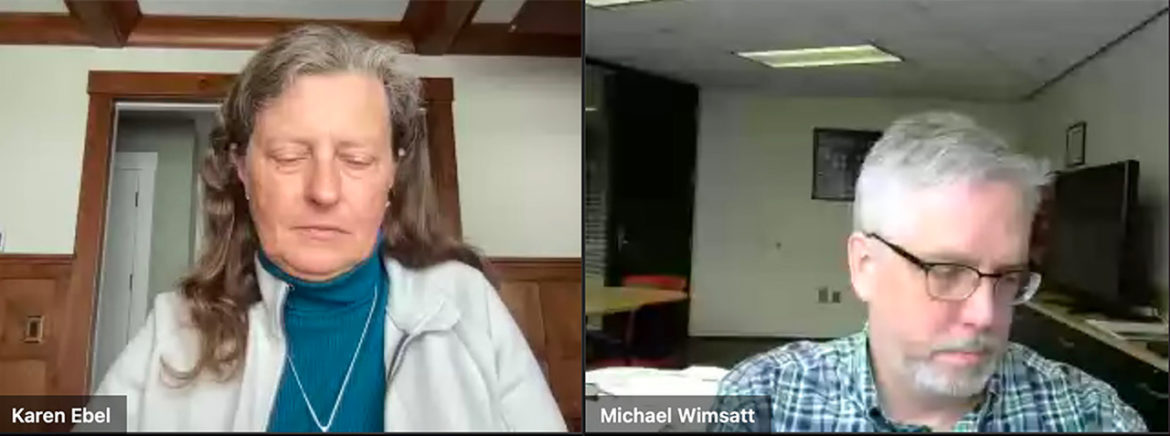By THOMAS P. CALDWELL, InDepthNH.org
CONCORD — As the Department of Environmental Services prepares for a barrage of new legislation surrounding solid waste issues, the state still has not received a definitive legal opinion on whether new laws would apply to landfill applications currently under consideration.
Rep. Howard Pearl, R-Loudon, said the new legislation exempts applications for the expansion of current landfills, but bills that aim at preventing new landfill permits — such as the one that would allow no new approval until the DES updates its solid waste plan — may face challenges.
“Does this impact current applications that are on file for landfills? We don’t really have a clear answer, I’ll be honest,” Pearl said during the March 25 meeting of the statutory working group established to assist the DES with planning and policy initiatives.
The group created subcommittees on Friday to assist in the preparation of a new solid waste plan, which the department aims to complete by October 1. The existing plan has not been updated since 2003.
The three subcommittees will focus on waste reduction and management of “difficult” wastes; recycling and composting; and alternate waste management technologies aimed at diverting waste or converting it into something useful.
Pending legislation would add responsibilities for the study of landfill siting criteria and recommendations on what can be placed in landfills.
The full solid waste working group plans to meet next on Earth Day, April 22, and Chair Karen Ebel, D-New London, said the subcommittees could meet earlier if they wanted to begin their work.
“I thought one of the products coming out of each of these subcommittees are some things that might meaningfully improve things,” Ebel said, commenting that an overarching need is to meet solid waste reduction goals by 2030 “or even earlier.”
New Hampshire is behind many states in reducing the amount of solid waste ending up in landfills, and the working group is looking at ways to catch up in areas such as the composting of food scraps.
Michael Wimsatt, the director of the Waste Management Division, announced the hiring of Paige Wilson, formerly with the Lakes Region Planning Commission’s solid waste section, to assist in planning and development of the new solid waste plan.
“We’re really lucky to get her,” Wimsatt said. “Not a lot of people have the resume she has coming to us, and she’s done a lot of solid waste planning work.”
Until her arrival, Wimsatt had a single staff member, Michael Nork, working on materials management, education, and planning, a job that included following legislation and providing background information to the working group.
Much of Friday’s meeting served to bring everyone up to date on how communities are currently handling solid waste and recycling.
Reagan Bissonnette, executive director of the Northeast Resource Recovery Association, spoke of the significant cost of transporting material — both solid waste and recyclables — and how complex the decisions are for communities. She noted, for example, that recycling aluminum appears to be profitable, bringing in between $1,380 and $2,060 per ton, but it takes a lot of aluminum to make up a ton. Mixed paper, on the other hand, brings in only $65 per ton, but is plentiful. Deciding whether and what to recycle based on cost is not an easy decision, she said.
Steve Poggi of the private firm Waste Management discussed landfill capacity, but explained that it, too, is a complicated matter, with some communities choosing to dispose of solid waste at one facility but hiring another company to transport it. He cited the example of the city of Laconia, which has Waste Management operating its transfer station and trucking the material to a waste-to-energy plant in Penacook, while Casella Waste Systems handles Laconia’s curbside pickup and transfers recyclables to that company’s recycling facility in Charlestown, Massachusetts.
Poggi also discussed the growing use of railroads to haul trash to other states, with Massachusetts sending 10,099 tons per day away by rail.
“If you can divert 20 to 25 percent of your waste from the landfill, you can get your composting going,” Ebel said. “The revised composting regs are effective, and it should loosen things up for new composting sites within the state of New Hampshire.”





